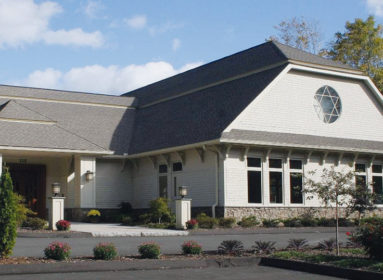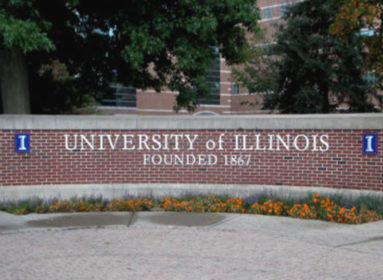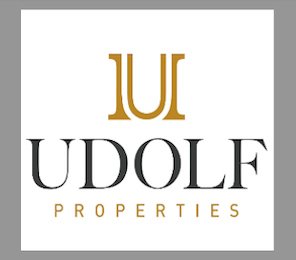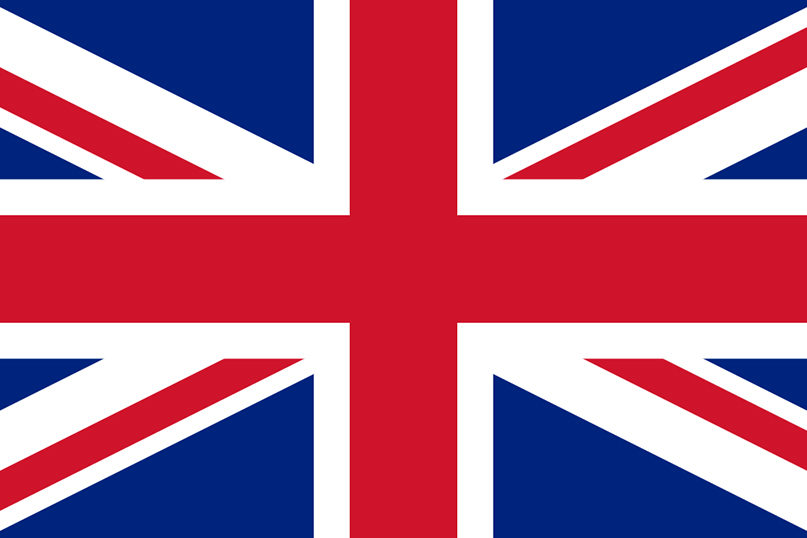
By Cnaan Lipshiz
(JTA) – For most of her adult life, Rachel Riley was only vaguely aware of her Jewish ancestry.
A moderately famous daytime game show television host, Riley, 33, is one of countless unaffiliated Jews in the United Kingdom – a country with 250,000 Jewish citizens and where synagogue attendance is at a historic low.
“When I was a kid my mum would give us pepperoni pizza,” she told The Times of London in an interview published Saturday, Feb. 2, pointing out that she didn’t keep kosher.
On Chanukah, she added, “We’d light the menorah candles but we didn’t go to synagogue and I’ve never done Friday night [Shabbat].”
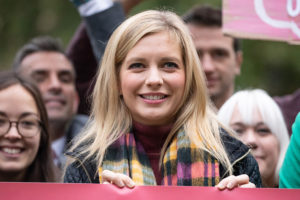
Rachel Riley poses with campaigners outside of the Houses of Parliament in London before delivering a petition to Downing Street, Oct. 8, 2018. Riley has spoken out in recent months about her Jewish identity and the antiSemitic abuse she has received online. (Handout/Tom Nicholson for Bauer Media via Getty Images.)
But after experiencing antisemitic abuse online for criticizing Britain’s liberal Labour party – whose far-left leader Jeremy Corbyn has been called antisemitic for his rhetoric and anti-Israel views – Riley was compelled to speak out, including in parliament last week, against the proliferation of that hatred and about how it has affected her own family.
“My family came over in the pogroms. For centuries Jews have been persecuted and kicked out of countries,” she said in the Times interview.
Riley’s revisiting of her Jewish identity is part of a larger process that is creating “an unparalleled unity and sense of solidarity amongst Jews of all persuasions” in the United Kingdom, the London-based Campaign Against Antisemitism watchdog group said.
The crisis generating this sense of unity centers on the 2015 election of Corbyn to head Labour. Thousands of his followers joined Labour for him, creating a toxic atmosphere for Jews and thousands of cases of hate speech against Jews in the party’s ranks.
Last year, Margaret Hodge, a veteran Labour lawmaker in the upper house of the British parliament, was probed by her own party over her criticism of Corbyn’s antisemitism problem. She said the party’s decision made her think of what it felt like to be a Jew in Germany in the 1930s.
It was a highly unusual statement from a person so unaffiliated that many British Jews didn’t even know she was Jewish.
“I have never been active in the Jewish community; my two marriages were to non-Jews,” she wrote in an Op-Ed for the Guardian in July. But, she added, “I am a Jew.”
As for Riley, before she began speaking out against antisemitism last fall, she was best known as one of the hosts of Channel 4’s long-running puzzle show “Countdown.” Her other claim to fame was her ability to solve math puzzles.
Few Brits knew that Riley, a blue-eyed blonde, is Jewish.
That began to change in September, when she took to Twitter to express her concerns about billboards that had been illegally placed across London reading, “Israel is a racist endeavor.” The signs, part of a war of words and billboards between Corbyn supporters and his critics, were over Corbyn’s objection to Labour adopting a definition of antisemitism that includes anti-Israel sentiment.
But as soon as Riley spoke about them, she exposed herself to antisemitic abuse online, she said. Her Twitter account – was inundated with racist and other insults by people she says are Corbyn fans.
“In the name of Labour I’ve been called a hypocrite, lying propagandist, tits-teeth-and-ass clothes horse, dolly bird, weaponizer of antisemitism, fascist, right-wing extremist, Nazi sympathizer, Twitter cancer,” she said during a Jan. 22 speech in parliament ahead of International Holocaust Remembrance Day. Other insults, she added, included: “Brainwashed, an antisemite, white supremacist, hate preacher, Zio political trollster, not a real Jew, a child bully, conspiracy theorist.”
She also got physical threats, leading her studio to increase security for her show.
During the same speech, she said that had someone told her a year ago that she’d be commemorating the Holocaust in parliament, “I wouldn’t know where to begin with my incredulity.”
Historically speaking, the galvanizing effect that antisemitism can have on some Jews’ sense of Jewish identity “is neither surprising nor unusual,” Keith Kahn-Harris, a London-based sociologist and writer, told JTA. “It often takes violent, crude antisemitism to make people discover what you might call ‘latent Jewishness.’”
In that sense, Riley’s experiences and reaction to them are part of how “antisemitism in the United Kingdom has gone from being a containable issue to a major public issue.”
The proliferation of antisemitism in Britain can be measured in the number of incidents reported (last year had 1,382 of them – an all-time record). It’s reflected in British media, which from 2016 on began devoting unprecedented levels of attention to the issue.
Much of the debate centers on the role of Corbyn, who in 2013 defended an antisemitic mural in London (he later expressed regret for that). In 2009 he called the terrorist groups Hezbollah and Hamas his “friends,” adding that the latter Gaza-based group is “dedicated towards the good of the Palestinian people and bringing about long-term peace and social justice.”
He has laid a wreath at a monument for the killers of Israeli athletes at the 1972 Munich Olympics and said in 2015 that “Zionists” who have “lived in this country for a very long time, probably all their lives,” don’t “understand English irony.”
Against this backdrop, even British Jews who rarely speak about politics in the Middle East or elsewhere find themselves under attack online.
On Monday, Feb. 4, another Jewish celebrity, “Game of Thrones” actress Laura Pradelska, told the BBC she turned off the comment option on her Instagram account because of antisemitic abuse that’s “mostly to do with Israel,” although she hardly ever posts about that country.
The leaders of the U.K.’s Jewish community prefer low-profile action. But the previous chief rabbi of Britain, Jonathan Sacks, has called Corbyn an antisemite – an accusation Corbyn has denied, adding he is determined to fight antisemitism in Labour and beyond. Last year, Britain’s three leading Jewish newspapers united in publishing a front-page editorial warning that a Corbyn premiership would constitute an “existential threat to Jewish life in this country.”
The events have even rallied unaffiliated Jews who have not experienced abuse themselves.
“I usually avoid politics but Corbyn is making the Jews feel really bad,” a Belgium-born Jewish woman from north London, who requested to remain anonymous, told JTA. It made her for the first time in her life join a protest against antisemitism last year outside parliament.
To her, the debate on antisemitism in Britain is catching up with local Jews who “did not suffer as much as other European Jews,” she added, because Britain was never occupied by the Nazis.
Murray Lee, an unaffiliated Jewish real-estate agent from London, said that Britain’s antisemitism problem “saddens” him primarily as a Brit, not necessarily as a Jew.
Asked whether the problem makes him think of his ancestors, Murray, who is a third-generation U.K.-born Jew, said: “It’s very hard to say no to that, but in principle, my ancestors are pretty much British.”
Despite star power, boycotting Israel has little appeal in the UK
By Cnaan Lipshiz (JTA)
The British branch of the Boycott, Divestment and Sanctions movement against Israel possesses a weapon matched by few other affiliates: star power.
More than any of its international counterparts, BDS UK enjoys the support of renowned musicians like Roger Waters, Brian Eno, Peter Gabriel, Richard Ashcroft and Jarvis Cocker, whom boycott activists like to parade in various petitions. Also on board are eminent filmmakers like Ken Loach and Mike Leigh, and even the celebrated actress Julie Christie has signed on.
The pro-Israel camp has its own British celebrity advocates, including singers Steven Morrissey, the Australia-born (but U.K.-based) singer Nick Cave and the band Radiohead.
What effect are these celebrities having in the fight for British hearts and minds?
Some insight can be found in the largest-ever poll on the popularity of the BDS campaign in Britain, the results of which were published Wednesday, Feb. 6.
It doesn’t look too good for BDS.
In the poll of 4,005 British respondents, only 10 percent agreed that Israel should be boycotted, compared to 46 percent who disagreed, according to the Ipsos MORI polling company. It conducted the survey in 2016 and 2017 for the Institute for Jewish Policy Research and the Community Security Trust.
Significantly, another 42 percent said they either had no opinion or did not know, with the remaining two percent saying they would rather not express an opinion.
Asked whether they agree that Israel is an apartheid state, 21 percent of respondents agreed, compared to 19 who disagreed. Here, too, the largest group by far was the “don’t knows,” with 42 percent.
Muslim respondents were almost four times likelier to agree with the need to boycott Israel than the average, the report said. But also among Muslims, the boycott contingent was in the minority and 16 percent of respondents from that group disagreed with boycotting Israel.
Another key finding came from the report’s attempt (the most comprehensive so far) to tackle the contentious claims that BDS is motivated by antisemitism. Boycott advocates say their response is merely to Israel’s human rights violations and control of Palestinian land.
Respondents to the poll were asked also to agree or disagree with a set of assertions regarded as antisemitic, including “Jews think they are better than others,” “Jews get rich at the expense of others” and “Jews exploit Holocaust victimhood for their own purposes.” The respondents who supported BDS and the apartheid analogy were significantly likelier than others to agree with these “more traditional anti-Jewish tropes,” the report said.
Among supporters of a boycott, only five percent endorsed none of the antisemitic tropes. By contrast, 58 percent endorsed five tropes or more. Among those who indicated that they think Israel is an apartheid state, 16 percent endorsed no antisemitic trope, while 47 percent endorsed six antisemitic tropes or more.
The report’s authors noted that 16 percent of the respondents who agreed with the apartheid statement displayed no anti-Jewish feelings. But, they added, “the fact remains that agreement with either statement positively correlates with anti-Jewish sentiment.”
Yet perhaps the poll’s most significant finding is how many respondents, about 42 percent, had no opinion on the BDS and apartheid issues either way.
“It is all too easy in heated debates about complex political matters to forget, or even dismiss, the fact that not everyone has an opinion,” the report’s authors, David Graham and Jonathan Boyd, wrote. Boyd is the executive director and Graham is a senior research fellow of the London-based Institute for Jewish Policy Research.
In the apartheid question, the undecideds accounted for the majority of respondents under 30, compared to only 26 percent undecideds among those in their 70s. And on the boycott question, undecideds accounted for 28 percent of respondents aged 16 to 29 – the largest proportion of undecideds of all other age groups.
To Mark Gardner, the communications director of the Community Security Trust – British Jewry’s watchdog and security group – these and other nuances show that the British celebrities promoting BDS “are largely irrelevant, despite the impression some of us may have about what they represent.”
By contrast, the ongoing debate about the British Labour Party’s spiraling antisemitism crisis, where Israel plays a central role, “is causing a lot of people to come out against antisemitism and come down on our side of the fence,” he said.
Mostly, though, Gardner said the analysis shows that there is “untapped potential for both sides.” He hopes the data from the survey “will be used as an effective tool to better understand where the fight against antisemitism is impacted upon by BDS and attempts to delegitimize Israel.”








 Southern New England Jewish Ledger
Southern New England Jewish Ledger